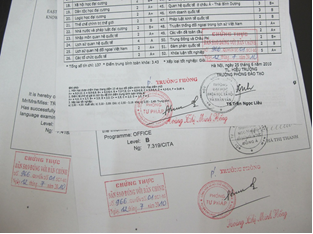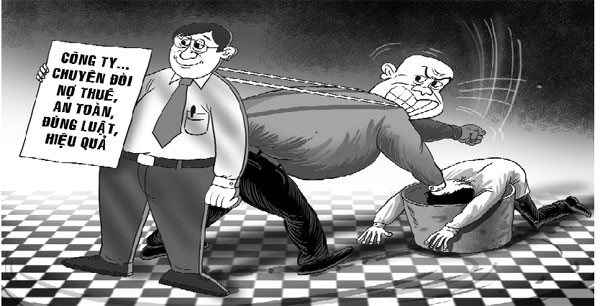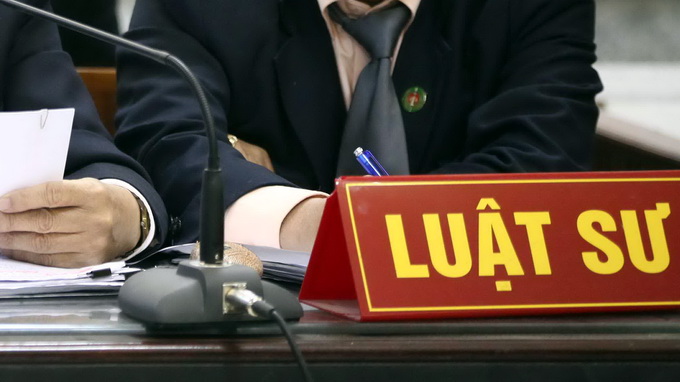The Amended Law on Notarization, alongside provisions inherited from the Law on Notarization of 2006, has revised regulations regarding the scope of notarization, thereby returning to notaries the authority to notarize document translations upon the request of individuals or organizations.
The notary public is also authorized to certify copies from originals, authenticate signatures on documents, papers, etc. Notably, the transfer of a notary office and the conversion of a notary office into a notary office are entirely new regulations in the amended Notary Law this time.
More Work for Notaries, More Choices for Citizens
In addition to certifying the authenticity and legality of contracts and other civil transactions in writing, Clause 1, Article 2 of the amended Notary Law stipulates: “A notary public has the right to certify the accuracy, legality, and social morality compliance of the translation of documents from Vietnamese to a foreign language or from a foreign language to Vietnamese, which according to the law must be notarized or is voluntarily requested for notarization by individuals or organizations.”
Accompanying this provision, Clause 1, Article 61 of the amended Notary Law specifies: “Translating documents from Vietnamese to a foreign language or from a foreign language to Vietnamese for notarization must be performed by a translator who is a collaborator of the notarial practice organization. The collaborator must be a university graduate in a foreign language or another university but fluent in that foreign language. The collaborator shall be responsible to the notarial practice organization for the accuracy and appropriateness of the content of the translation he/she performs.”
This regulation aims to facilitate citizens in using certified translations and to prevent situations where, upon discovering translation errors, citizens do not know whom to hold accountable for compensation. Clearly defining that the translation collaborator must be responsible to the notarial practice organization for the accuracy and appropriateness of the translation content is also a basis to ensure that translators' responsibilities are elevated throughout this process.
Additionally, the amended Notary Law has expanded the scope of operations for notarial practice organizations and notaries. Article 73 stipulates: “Notaries are authorized to certify copies from originals and authenticate signatures on documents and papers. The certification of copies from originals and the authentication of signatures on documents and papers shall be carried out in accordance with the law on authentication.”
This provision aims to make it more convenient for citizens to choose and access this type of public service, while the District Justice Division and the Commune People's Committee continue to perform authentication tasks as stipulated in Decree No. 79/2007/ND-CP as currently.
Tightening Conditions for Exemption from Notary Training
The amended Notary Law more clearly defines the legal status of notaries as State “public officials,” appointed by the Minister of Justice to practice notarial services, under the dual management of the State and the professional social organization of notaries.
Article 3 of the amended Notary Law explicitly states: “Notaries provide public services entrusted by the State to ensure legal safety for the parties involved in contracts, transactions; prevent disputes; contribute to protecting the lawful rights and interests of individuals and organizations, and to socio-economic stability and development.”
Under the 2006 Notary Law, people who had been judges, prosecutors, investigators, or lawyers practicing for three years or more could be exempted from notary training. Now, this period has been extended to five years. Clause 1, Article 10 of the amended Notary Law specifies those exempted from notary training include: those who have served as judges, prosecutors, or investigators for five years or more; lawyers who have been practicing for five years or more; professors, associate professors of law, doctors of law; persons who have been senior court assessors or senior procuracy inspectors; senior experts, senior researchers, or senior lecturers in the legal field.
Besides extending the actual working period of those exempted from notary training (from 3 years to 5 years), the amended Notary Law also adds a requirement that those exempted from training must participate in a three-month skills training course on notary practice and notary ethics at a notary training institution before being appointed as notaries.
Permission to Transfer Notary Offices
Notably, in this revision, the Notary Law 2014 has stipulated: “In cases where it is unnecessary to maintain a notary office, the Department of Justice shall develop a project to convert the notary office into a notary office and submit it to the provincial People's Committee for consideration and decision. The Government of Vietnam shall specify the conversion of the notary office into a notary office” (Clause 1, Article 21).
Regarding notary offices, the amended Notary Law stipulates “there must be at least two partnering notaries.” This provision aims to maintain the operation of the office in cases where the chief notary is sick, injured, or unable to practice for personal reasons for a certain period as has happened in practice.
Notably, Article 29 of the amended Notary Law stipulates that a notary office may be transferred to other notaries when: The notary receiving the transfer of the notary office has been practicing for two years or more, committing to practice at the transferred notary office and to inheriting the rights and obligations of the transferred notary office.
However, the law also stipulates that notaries who have transferred their notary offices are not allowed to establish a new notary office within five years from the date of transfer. The provincial People's Committee shall consider and decide on the transfer of the notary office. The Government of Vietnam shall specify the procedures for transferring notary offices.
Besides these provisions, the amended Notary Law also adds many regulations on notarial practice principles, the legal value of notarized documents, prohibited acts, notary standards, notary internships, re-appointment of notaries, rights and obligations of notaries, and more.
The amended Notary Law (effective from January 1, 2015) is believed to address the limitations and shortcomings of the institution, providing a legal basis for a new development stage of notarial activities in line with the policy of private investment, elevating the quality and sustainability of notarial services, and gradually developing the notarial profession in Vietnam in line with international practices.
According to the Vietnam Law Journal
 Article table of contents
Article table of contents









